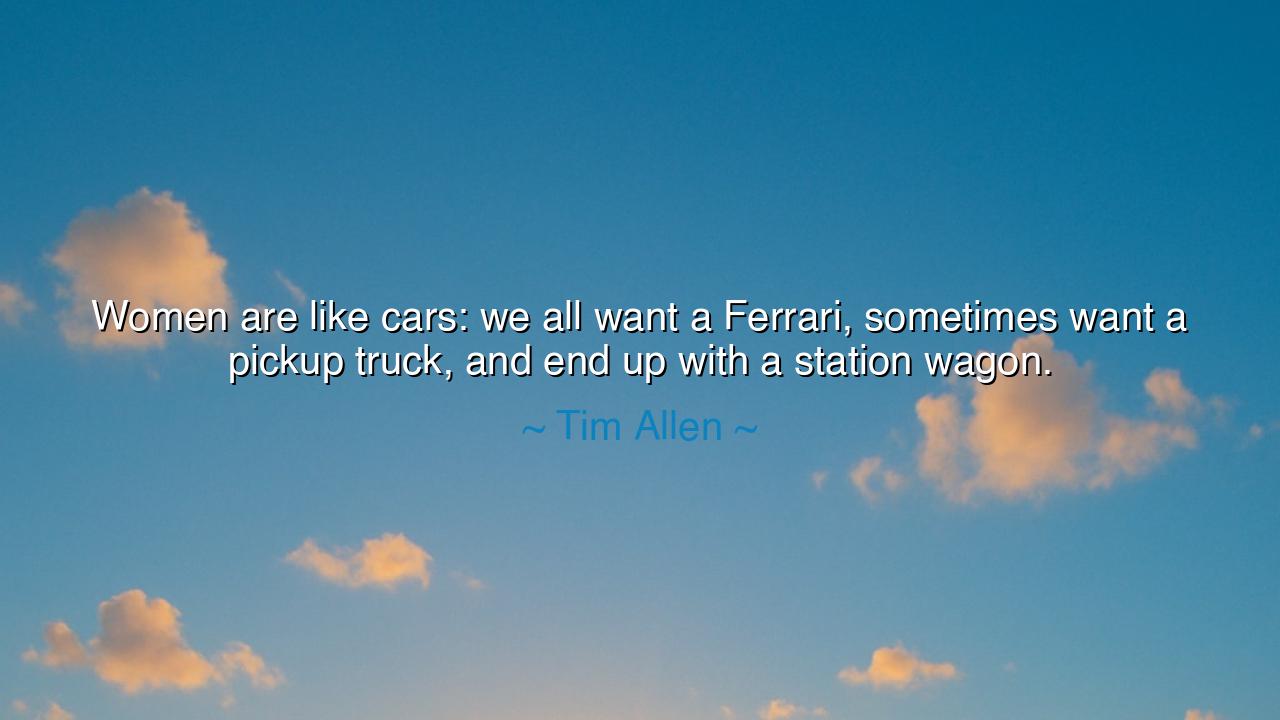
Women are like cars: we all want a Ferrari, sometimes want a
Women are like cars: we all want a Ferrari, sometimes want a pickup truck, and end up with a station wagon.






When Tim Allen said, “Women are like cars: we all want a Ferrari, sometimes want a pickup truck, and end up with a station wagon,” he spoke in jest — yet within the humor lies an ancient truth about human desire, illusion, and acceptance. Beneath the laughter, his words touch upon the restless nature of the human heart: our tendency to chase ideals, to long for excitement and perfection, and yet to find ourselves, in the end, face to face with reality — humble, imperfect, and real. Though Allen’s metaphor speaks of relationships, its wisdom reaches beyond romance into the nature of all human striving. For what he describes is not only love’s folly, but the universal story of aspiration meeting contentment.
The Ferrari — that gleaming symbol of speed, beauty, and status — represents all that is thrilling and untouchable in our imagination. When we are young, or when desire burns bright, we long for the impossible — the perfect partner, the perfect dream, the perfect life. The pickup truck, rugged and capable, stands for the practical, the strong, the one who helps us through the storms and labors of life. And the station wagon, humble and steady, is what we often end up with — not because fate mocks us, but because life teaches us to value reliability over illusion. What Allen cloaks in comedy is a truth philosophers have pondered for centuries: that what we want is rarely what we need, and that wisdom begins where fantasy ends.
This pattern of desire and realization is as old as love itself. The ancients told stories of men and women who chased beauty, only to discover that beauty fades, and that the soul endures. Paris of Troy, lured by Helen’s radiance, brought about the ruin of empires — for he mistook passion for destiny. His “Ferrari,” though dazzling, led him to ashes. Yet the farmer who loves the woman who stands beside him in the field — who bears the weight of time with him, who shares his labor and laughter — finds a truer kind of joy. Allen’s station wagon is not failure, but enlightenment: the discovery that love is not the glitter of the beginning, but the endurance of the years that follow.
In this way, Allen’s humor reveals the evolution of the heart. The youth seeks the Ferrari — the blazing beauty of passion. The grown man, wearied by life’s burdens, seeks the pickup truck — the partner of strength and substance. But the wise man, who has lived and lost and loved again, learns to treasure the station wagon — the companion who stays, who carries the family, who may not dazzle but who endures. His laughter is not mockery, but acceptance — the kind of laughter born from gratitude. The station wagon, plain to the eyes, is often gold to the soul.
There is a lesson here not only for love, but for all human ambition. We dream of Ferraris in every field — the perfect career, the perfect home, the perfect life. Yet what life offers us, in the end, is not the thrill of perfection, but the contentment of meaning. The Ferrari is fleeting; the station wagon carries us to our destination. The wise learn to recognize beauty in what endures, and to see that love, like life, is not about constant speed or shine, but about continuance, companionship, and care.
Consider also the story of Marcus Aurelius, emperor and philosopher. He ruled the mightiest empire in the world, surrounded by splendor and luxury — yet he wrote, “Very little is needed to make a happy life; it is all within yourself.” Like the man who learns to love his station wagon, Aurelius realized that peace does not lie in the possession of grand things, but in the acceptance of simple ones. Desire may promise happiness, but only gratitude fulfills it.
Thus, O seeker of truth, hear the hidden wisdom in Tim Allen’s jest: do not scorn the station wagon of your life. Do not weep that your dreams were less grand than your fantasies. The Ferrari may be glorious, but it is fleeting — it shines today and rusts tomorrow. The station wagon endures through the years, carrying laughter, memory, and love. In time, you will see that it was not the lesser choice, but the truest one.
And so, let this teaching be your guide: embrace what endures. Cherish the ordinary, for it is the vessel of extraordinary love. Seek not the perfect, but the faithful; not the fast, but the steadfast. For life, like love, is not about how brightly it begins, but how faithfully it endures to the end of the road.






AAdministratorAdministrator
Welcome, honored guests. Please leave a comment, we will respond soon